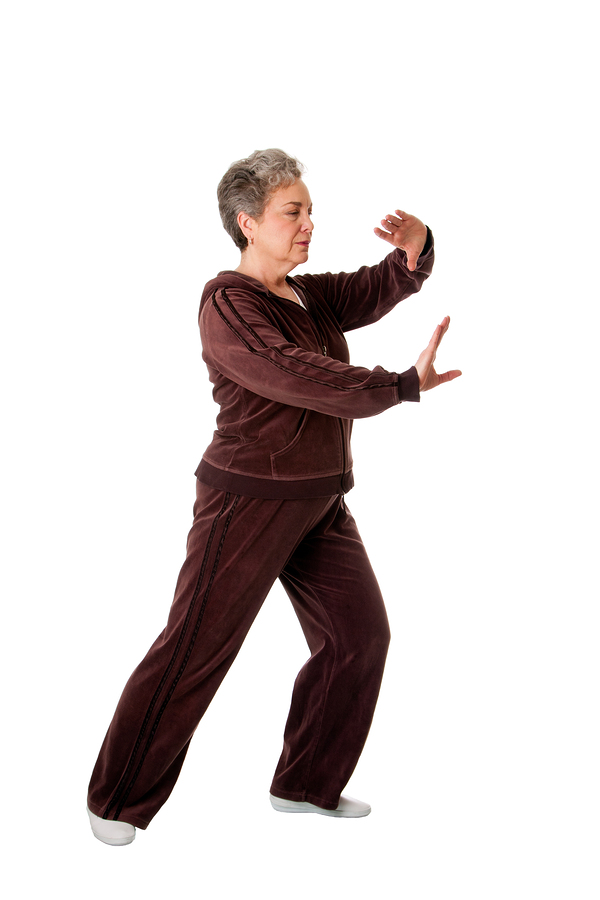Why Your Mother Needs Tai Chi
You may have seen them on a hillside, slowly raising one leg in the air and holding that pose. Seniors everywhere are learning and practicing tai chi, an Asian exercise regime, that combines elements of meditation with movements that improve coordination. These movements are particularly useful to people over 65.
Why is that, you ask? It’s because, in the United States, every four minutes, an older adult dies from falling.

As we age, balance becomes more precarious. Simultaneously, the danger of falling becomes exponentially greater. One of four seniors reports falling. And many of those who fall break a hip or a pelvic bone. Those are serious enough injuries, but the most dangerous damage comes to people who hit their heads during a fall. Brain trauma can be a factor in developing dementia.
People over 65 frequently go to the emergency room after a fall. Medicare shells out approximately $31 billion a year, just to treat patients who are hospitalized after a fall.
This is Where Tai Chi comes In
Tai chi was originally a martial art. Today, it has important applications for seniors whose balance has been compromised by muscle loss, neurological deterioration, stroke, Parkinson’s disease, and/or medications. Senior care experts agree that tai chi is effective in pre-empting falls by improving balance.
Tai chi involves slow movements that progress slowly in one direction and then reverse direction. This reflects the yin and yang philosophical basis of tai chi. Practitioners of tai chi also practice controlled breathing concurrently with movement.
The result is that core muscles and limb muscles get exercised while the practitioner breathes in a way that reduces stress. Several studies back up the claim that tai chi is good for balance, especially fall prevention. One study suggests that seniors doing regular tai chi are fifty percent less likely to suffer a fall injury.
Other benefits
And reducing fall risk is not the only benefit of tai chi. This doable exercise is also good for:
- Reducing chronic pain, especially in the neck, back, and knees when caused by osteoarthritis.
- Improved brain function
- Improved quality of life in cancer and heart patients
- Alleviating the symptoms of fibromyalgia
Best Practices
Tai chi is best learned in a class with an instructor who can make sure that your mother or father is learning it properly. It’s important to note that many dance classes are currently offered on line. Learning a new exercise on one’s own is not recommended for seniors who are not generally athletic because of the risk of injury.
It’s a good idea for seniors who are very fragile to discuss starting tai chi with their primary care physicians. A physician may, in fact, be able to recommend a specific class or instructor.
Tai chi and a sister discipline, qi gong, are good exercises for seniors because the movements are gentle and slow. The risk of injury is substantially lower than with exercises such as aerobic dancing, pilates, and zumba.
Of course, a good exercise plan needs to be part of an overall care plan that includes eating well, getting enough sleep, and complying with doctor recommendations. In this, you will find that home care for your mother or father will be a tremendous benefit.
Home care professionals can encourage a senior to stick with an exercise regime by practicing at home and getting to classes on time. For seniors who need to stop driving, the home care professional is able to provide transportation.
In conclusion, falling is one of the greatest risks posed by old age. Caregivers should be aware that tai chi is a great exercise to improve balance and prevent falling. Tai chi is also useful in alleviating a wide range of senior pain.
Sources
https://thedoctorweighsin.com/fall-prevention-tai-chi/
https://www.nccih.nih.gov/health/tai-chi-and-qi-gong-in-depth
If you or an aging loved one is considering elder care in East Brunswick, NJ, please contact the caring staff at Care Street Home Care today. Call (732) 607-8870.
- Signs Your Senior Parent Needs Home Care Assistance - January 17, 2025
- Hearing Rehabilitation: Empowering Seniors for Better Living - January 10, 2025
- Understanding How Cartilage Changes Over the Years - January 3, 2025
